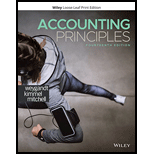
ACCT.PRINCIPLES (LL)
14th Edition
ISBN: 9781119707110
Author: Weygandt
Publisher: WILEY
expand_more
expand_more
format_list_bulleted
Question
error_outline
This textbook solution is under construction.
Students have asked these similar questions
Under GAAP, companies are permitted to recognize bad debt expense based on estimated bad-debt losses as of the time of sale, rather than when the accounts are actually written off. Identify one aspect of the conceptual framework of accounting that supports this treatment and one aspect that might not support it.
Which of the following statements is false?
Group of answer choices
A)The journal entry to record bad debt expense decreases current assets.
b)The journal entry to record bad debt expense decreases retained earnings.
C)The journal entry to write-off an uncollectible account receivable decreases operating income.
D)The journal entry to write-off an uncollectible account receivable does not affect current assets.
e)All the above statements are correct.
A company is required to report a liability on its balance sheet when it expects to lose a lawsuit and the amount of the expected loss can be reasonably estimated (FASB) Conversely, a company is prohibited from reporting a receivable in its balance sheet when it expected to win a lawsuit even though that is probable and the amount of the expected gain can be reasonably estimated.
a. Explain why expected loss and gain are treated differently in accounting in the situation of a lawsuit.
b. Give an example of a company that experienced an expected loss and gain due to a lawsuit. Provide the disclosure in their financial statements on gains and losses.
Knowledge Booster
Similar questions
- The allowance for doubtful accounts, which appears as a deduction from accounts receivable on a statement of financial position and which is based on an estimate of bad debts, is an application of which of the following? a. Expense recognition principle. b. Consistency characteristic. c. Materiality quality. O d. Revenue recognition principle.arrow_forwardThe allowance for doubtful accounts, which appears as a deduction from accounts receivable on a statement of financial position and which is based on an estimate of bad debts, is an application of which of the following? a. Revenue recognition principle. b. Materiality quality. c. Consistency characteristic. d. Expense recognition principle.arrow_forwardWhat are some of the most common types of accounting distortions that can arise? How can adjustments to the standardized financial statements be made in order to undo these distortions?arrow_forward
- Which of the following are financial statement frauds? Select which three options are correct. A. Intentional misapplication of accounting principles related to amounts. B. Forging of accounting records C. Intentional misapplication of accounting principles related to disclosure. D. Unintentional omission from the financial statements of transactionsarrow_forwardIf a company reported fi ctitious revenue, it could try to cover up its fraud by: A . decreasing assets.arrow_forwardInformation is immaterial if omitting it or misstating it could influence decisions that users make on the basis of the financial information of a specific reporting entity. True Falsearrow_forward
- What is the primary difference between fraud and errors in financial statement reporting?arrow_forwardIdentify one specific type of accounting fraud. What damage does the perpetration cause? What could be done to prevent it?arrow_forward"In the field of accounting, errors can occur at various stages of the financial reporting process, and it's crucial to identify and correct them to maintain the accuracy of financial statements. One common type of error is the error, which occurs when a transaction is recorded with the wrong amount or in the wrong account, leading to discrepancies in the balance sheet and income statement. Another type of error is the error, where a transaction is completely omitted from the accounting records, resulting in an imbalance between the debit and credit sides of the accounts. Furthermore, errors can also occur when the same transaction is recorded twice, causing an overstatement of assets, liabilities, revenues, or expenses. Lastly,........ errors refer to errors in the timing of recording transactions, such as recognizing revenue or expenses in the wrong accounting period. These errors can distort the financial performance of a company and mislead stakeholders. In summary, identifying and…arrow_forward
- If a company reported fi ctitious revenue, it could try to cover up its fraud by: B . increasing liabilities.arrow_forwardWhat are the disclosure requirements for a correction of an accounting error?arrow_forwardSomething is deemed to be 'material' if its omission, non-disclosure or misstatement is likely to affect economic decisions or other evaluations made by users entitled to rely on the financial statements. Select one alternative: True Falsearrow_forward
arrow_back_ios
SEE MORE QUESTIONS
arrow_forward_ios
Recommended textbooks for you
 Auditing: A Risk Based-Approach (MindTap Course L...AccountingISBN:9781337619455Author:Karla M Johnstone, Audrey A. Gramling, Larry E. RittenbergPublisher:Cengage Learning
Auditing: A Risk Based-Approach (MindTap Course L...AccountingISBN:9781337619455Author:Karla M Johnstone, Audrey A. Gramling, Larry E. RittenbergPublisher:Cengage Learning Financial Reporting, Financial Statement Analysis...FinanceISBN:9781285190907Author:James M. Wahlen, Stephen P. Baginski, Mark BradshawPublisher:Cengage Learning
Financial Reporting, Financial Statement Analysis...FinanceISBN:9781285190907Author:James M. Wahlen, Stephen P. Baginski, Mark BradshawPublisher:Cengage Learning

Auditing: A Risk Based-Approach (MindTap Course L...
Accounting
ISBN:9781337619455
Author:Karla M Johnstone, Audrey A. Gramling, Larry E. Rittenberg
Publisher:Cengage Learning


Financial Reporting, Financial Statement Analysis...
Finance
ISBN:9781285190907
Author:James M. Wahlen, Stephen P. Baginski, Mark Bradshaw
Publisher:Cengage Learning